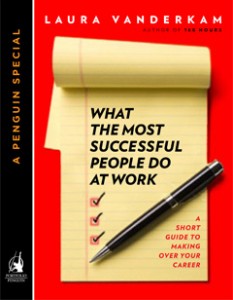No matter what your field, you no doubt know a few superstars: people who somehow manage to outshine everyone else in terms of productivity, while keeping health and sanity intact. Every field has its Einsteins and Hawkings. You may even be one of them.
 In recent years, my colleague Laura Vanderkam has scrutinized how such superstars handle the 168 hours a week we’re all gifted with, and what makes them so much more productive than most. She’s reported the results not only in her bestselling 168 Hours: You Have More Time Than you Think, but also in e-books like What the Most Successful People Do on the Weekend and What the Most Successful People Do Before Breakfast. On April 23, Portfolio/Penguin will release the latest in the series, What The Most Successful People Do at Work. Like its predecessors, it’s jam-packed with a host of excellent observations drawn from interviews, anecdotes, and personal observations, well worth the two hours (tops) you’ll spend reading it.
In recent years, my colleague Laura Vanderkam has scrutinized how such superstars handle the 168 hours a week we’re all gifted with, and what makes them so much more productive than most. She’s reported the results not only in her bestselling 168 Hours: You Have More Time Than you Think, but also in e-books like What the Most Successful People Do on the Weekend and What the Most Successful People Do Before Breakfast. On April 23, Portfolio/Penguin will release the latest in the series, What The Most Successful People Do at Work. Like its predecessors, it’s jam-packed with a host of excellent observations drawn from interviews, anecdotes, and personal observations, well worth the two hours (tops) you’ll spend reading it.
Laura boils her results down to seven common-sense disciplines that all highly successful people apply to their work:
• Mind Your Hours. Rather than simply assuming you know how you spend your work time, track it closely so you know exactly how you use those hours—and so you can hold yourself accountable for each one.
• Plan. Figure out what you need to do with your time; then plug those tasks into your schedule. Set aside a brief planning interval on a daily or weekly basis, so you know exactly what to do as soon as you get up in the morning.
• Make Success Possible. Prioritize your schedule, focusing on getting the most important things done first. View those not just as to-do items, but also as contracts with yourself and with your clients. Be very choosy about what you do, and develop an accountability system that works for you.
• Know What Is Work. Discriminate between what truly comprises work and what does not. Most importantly, avoid things that resemble work but aren’t, like repeatedly checking email and attending too many meetings. If it’s unproductive and doesn’t help the bottom line, it isn’t work—so get rid of it.
• Practice. Mastery of your primary responsibilities requires constant practice that stretches your existing capabilities. Keep pushing yourself, or you’ll lose your productive edge.
• Pay In. Monitor and consistently add to your career capital. Don’t rest on your laurels; keep accumulating more contacts, knowledge, skills, and experience. Constantly search for the things you’ll need in order to succeed in the future. That way, you can cash in some of your chips when necessary without damaging your career.
• Pursue Pleasure. Find something about your career you love, and pursue it with a passion. As Laura Vanderkam points out, “Productivity, we are discovering, is a function of joy.” Maybe that’s why the people she profiles all make it look easy, despite their insanely busy schedules: they simply love what they do.
If What The Most Successful People Do at Work has a unifying theme, it’s this: simple clarity offers the key to happiness and high productivity in your job. Superbly competent people don’t fool themselves about what their work entails. They clearly see what they need to do in order to succeed, and they reach for it. Instead of letting themselves implode in the pressure-cooker environment of a demanding job, they excise the unnecessary, plan everything, and allow themselves to love what they do. Obviously, overpressure and such clarity can’t co-exist for long; these people are the survivors who’ve found the sweet spot between success and overwhelm. Laura Vanderkam’s new book can help you do the same, and I highly recommend it.


